This article is part of Goonhammer Historicals Year of the Ship – you can find the rest of the series here
If we’re going to play Napoleonic Naval Combat this year (and believe me, we are) then it’s a good idea to get some idea of what ship to ship (or brig to sloop, or xebec to cutter) combat might have felt like. Usually when starting a new-to-me historicals project I’ll read as widely as possible, take in different authors, mix in fiction and non-fiction, first hand accounts and synthesising histories. But not this time. This time it’s about reading deep, and wonderfully. So, instead of a selection of recommended reading, I’m just going to recommend one series: Patrick O’Brian’s Aubrey/Maturin epic, starting off with Master and Commander.
There’s not a moment to be lost!
You might – you probably – have seen or heard of the movie. The 2003 Peter Weir directed, Russel Crowe and Paul Bettany starring, Master and Commander is, pretty much, a perfect movie. I’d seen it a couple of times before starting the books, a roaring adventure story of two men who are firm and fast friends, of cannon and rigging, smoke and oakum, all bloody good stuff. On its own the movie is a great inspiration for Napoleonic wargaming and enough to make you wistfully stare out of any nearby window hoping that, somewhere out there, there’s a sequel in the works.
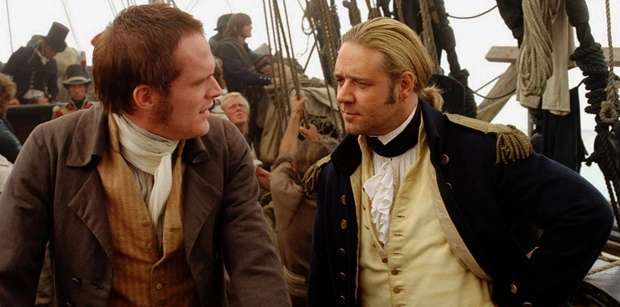
The books the movie is based on weren’t as well known to me. Patrick O’Brian wrote 20 and a half books of the Aubrey/Maturin series from 1969 to his death in January 2000, and they’ve gone through cycles of popularity and unpopularity, but never been allowed to go out of print.
They tell the story of Jack Aubrey, an officer in the British Navy, and Stephen Maturin, physician, intelligence agent and frequent laudanum drinker, as they navigate the murky waters of war, domestic life, navigation and friendship from 1800 to 1815. It’s a journey with peaks and troughs, shipwrecks, arguments, duels, taut rigging and loose morals, explosions, pirates, platypuses, poetry, more boarding actions and cannon fire than you could shake a stick (or the end of a rope) at and endless twists and turns. Through it all, the fast thread of friendship keeps the series ticking and grounds a story that could turn to the uncritically heroic in a realistic and relatable pairing.

There’s 21 books in the series, and they all form a continuous single story, many of them picking up as quickly after the prior as a blink of the eye. I’ve sat down over the last two months and am very sad to say I’m nearly done. When I am, I’ll pick them up again. You should too. Because they’re great. With all my heart, here’s why.
Always go at Them
You should read them because they’re bloody exciting books. The series begins in the Mediterranean and the Atlantic, but expands, journey by journey, to everywhere on earth, and England too. Wherever they roam, the books are tightly written, fascinating, often very funny, and humanely written. It’s character-driven, but also action packed, with every book containing at least one (or many, many more) section of pacy cannon-and-carronade action, or perilous sailing on a tempestuous sea. The action is always exciting and enthralling, and some of the set pieces O’Brian creates in the series will stick in my mind for a very long time. Even conversation is exciting, as O’Brian has the ability to conjure peril and complication out of nowhere without it ever feeling cheap. It’s hard to give excellent examples of that without hitting spoiler territory, but perhaps I can just say “COCAINE RATS!” and leave it there. The stories are all grand adventure territory, whether “plucky young lads making money” (Master and Commander) or “HR nightmare on HMS Surprise” (Clarissa Oakes) or even “Bear Market Blues” (The Reverse of the Medal). Whatever is going on, you’re firmly along for the ride, watching Jack, Stephen and the along with the rest of the ever growing cast (will Killick ever polish the silver to his satisfaction? When will Pullings make Post?) make decisions and commit actions that stick with them from book to book.
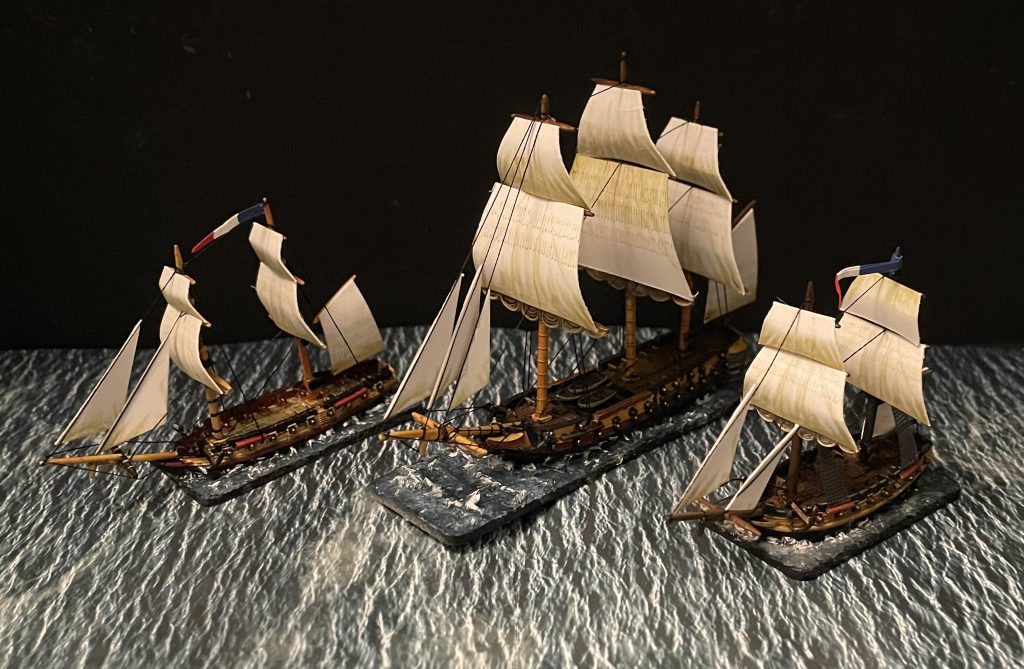
You should read them because Jack and Stephen are characters you can become deeply attached to. They’re both well-written men of their time, with all the prickly pride and strange obsessions you’d expect with any notion of the 18th and 19th centuries, but they’re also deeply feeling men. Jack broods and grieves for both men and ships, resenting life on land while missing his dependents back home. Stephen ponders deeply on Irish independence, his tempestuous love life, friends and opportunities both seized and missed. I found all that quite surprising, expecting a manly-man story of burly lads doing naval stuff, perhaps with all the reserve of Mr Darcy, and found men who quarrel and bicker, but who bond, grow close and drift apart, find pleasure in each other’s company and feel – and communicate – a great deal of love for one another. They feel real, for all that their exploits are occasionally insane and that both are virtually unimpeachable titans in their element, Jack the astonishing sailor and Stephen the fautless physician. You know them to the extent that you grieve their errors and wish that you could step in and perhaps lend a little advice, occasionally because you’re howling at knowledge only you possess as the reader, but usually because you just want your friends to be happy.
You should read them because the positivity of that friendship, the reality of it, stands in a different light now than perhaps it did when the books were first written. We live in a world where, particularly for men, there are pressures to be even more closed off emotionally than ever before. On the page, when Jack is puzzled as to Stephen’s enthusiasm for yet another type of Booby (bird connotation), or when Stephen is haranguing Jack about his choleric ardour for Booby (not-bird connotation)*, when Pullings and Jack are discussing promotion, or later when Stephen and Parson Martin witter happily to one another about Apes, there’s a positivity to that male friendship that is heartening to see. Perhaps if we called each other dear heart more often, or – as happens all too rarely in the series – just flat out said “I’m glad you are around, you make me happy” to each other, we’d all be a little healthier and happier.
*I’m keeping this in because I found it funny
You should read them because (can you see how serious about this I am yet?) While both Jack and Stephen feel very real, they also stand in for perspectives on a rapidly changing world. Jack is traditional – a naval officer, beholden to and a champion of order and discipline, considered traditional even in the service. He’s a man built for war and living in the most exciting times possible for a man like him. When 1815 comes around – hell, when 1802 comes around – he is a little lost, a new world beckons that might not give him his part to play. Stephen is the man of that new world. A physician, naturalist, intelligence agent and champion of self determination. Out of the ashes of the pre-Napoleon world order and the chaos of war will come his time, as the French and Spanish empires crumble and the world opens up for a man with a notebook, a collecting net, and a plan. There’s a constant tension between the two perspectives, veering between literal and obvious and thematic and subtle. What seems like the careening adventures of two guys, a ship and their crew across the world is more than that, an exploration of how the terminal Enlightenment gave way to Romanticism, war to trade and the new and terrible age of Colonialism took hold.
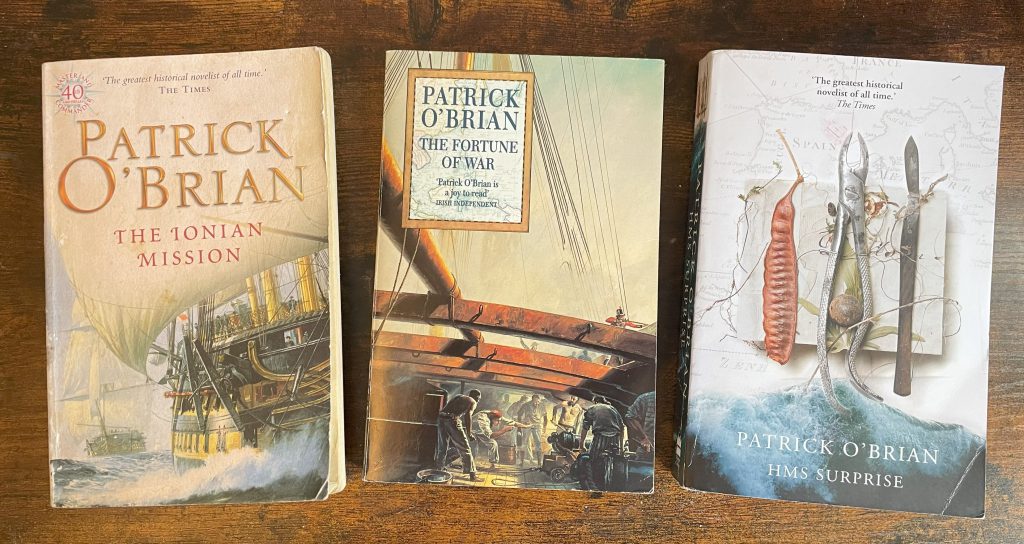
Above all, they read exceptionally well, O’Brian showing a real flair for character, action and plot that, despite a 21 book series where the plot is usually summed up as “Jack does some sailing and shooting while Stephen does botany/complains/falls down ladders/intelligence work” the thought of getting bored hasn’t even crossed my mind. As I write this, I’m putting down book 17 and picking up book 18. I haven’t stopped reading them from the first lines of Master and Commander – I’d wager it might be the same for you.
Both their setting and their context as novels means there are problematic and difficult bits within the books. Characters of colour are often relegated to a background role, the interesting colonial terrain over which adventures happen. They aren’t always, but the characters often think and act as they would in the 19th century. Encounters in places such as the Maluku Islands and in Australia are uncomfortable upon occasion, and the discussion of homosexuality and homosexual characters is occasionally unpleasant – though the few outwardly homosexual characters are usually (there are some exceptions to this, unfortunately) well treated by the author. Women are largely absent, or at home – and when at home are melancholy, scheming or inscrutable. They can’t be recommended without this caveat, but in comparison to other contemporary novels – both historical and otherwise – and certainly in comparison to historically contemporary accounts, they are notably fairer, kinder and more tolerant. Jack learns to shed prejudice against Irish people and Catholics, Stephen offends Bostonian society by treating African American people equitably, and both have a great deal of respect for their polyglot, multi-racial crews. The books are by no means perfect, but there’s nothing on the level seen in the Hornblower series, and where characters are outright racist and intolerant, it’s usually used as a shorthand that they’re an absolute bastard.
Moon Faced Night Ape, or, Reading for Play
So they’re bloody great books, but this is the Thursday Historicals slot, so we should probably talk about what they mean for playing games. No surprise to find I think they’re bloody great for that too!
There’s a couple of points for this that makes reading the series an excellent primer for choosing fleets, building, painting and playing Napoleonic naval combats.
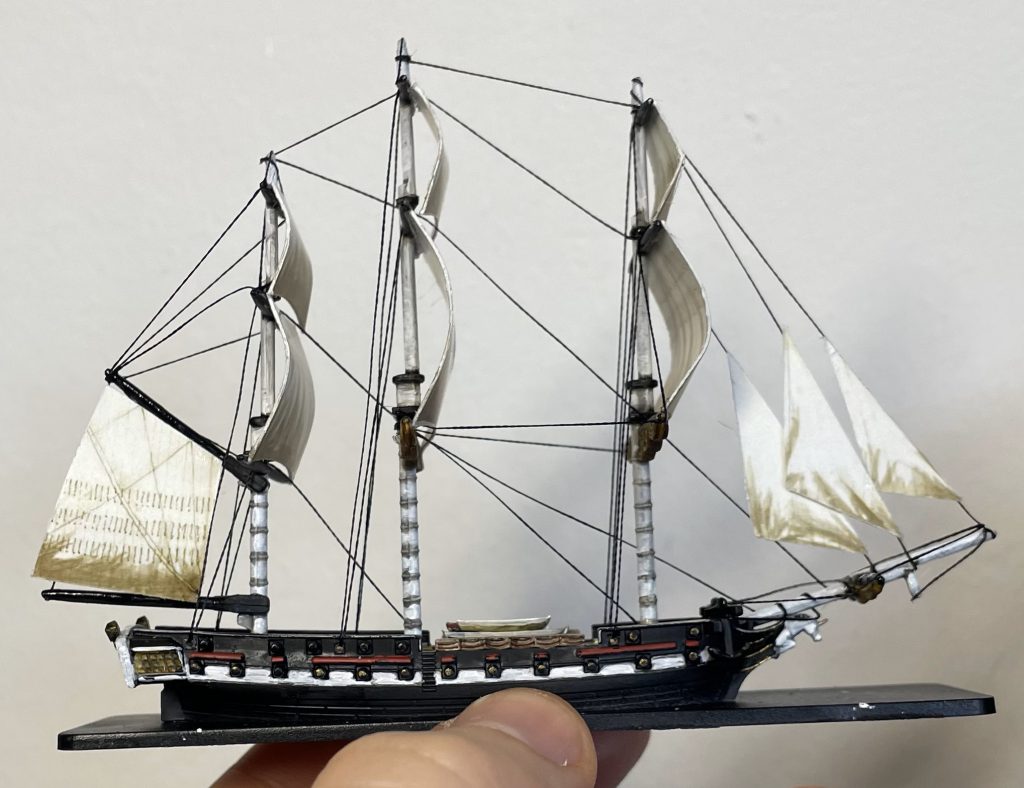
First off, a lot of Napoleonic ship or fleet games presume a frankly unneccesary degree of technical sailing terminology, knowledge and familiarity in rules writing. As a lubberly cove flicking open a rulebook to see sections on rules for “wearing” “tacking” or “stays” without any context or indication what those actually are is a bizarre and frustrating experience. Even modelling, with instructions like “tie the main foretop rigging to the bowsprit”, makes bugger all sense without a fair bit of prior knowledge. You could, I suppose, read a very dry wikipedia page to see what all this means, or study sail diagrams to find the names of every sail. But that’s much much more boring than learning the lingo because Jack is shouting it in Stephen’s ear during a chase in heavy seas.
Secondly, they’re chock full of action sequences that make for excellent scenarios, campaigns and narrative events for any number of Napoleonic naval games. They’re a real mix of small fleet actions (The Mauritius Command), two to three ship clashes (The Nutmeg of Consolation) and tense, single-ship actions (virtually all the others). Every book has at least one ready-made scenario in it, with every variable you’d need to translate to the tabletop laid out clearly. A little interpretation from page to tabletop is all you’d need. Given the widespread (and long-lived) popularity of the series, it’s no wonder that tabletop gaming companies have bent over backwards to make their games work with the series – Warlord Games’ Black Seas, for example, is very much “Jack Aubrey: The Game”, with both rules and range built around making sure you can play as close to the books as possible.
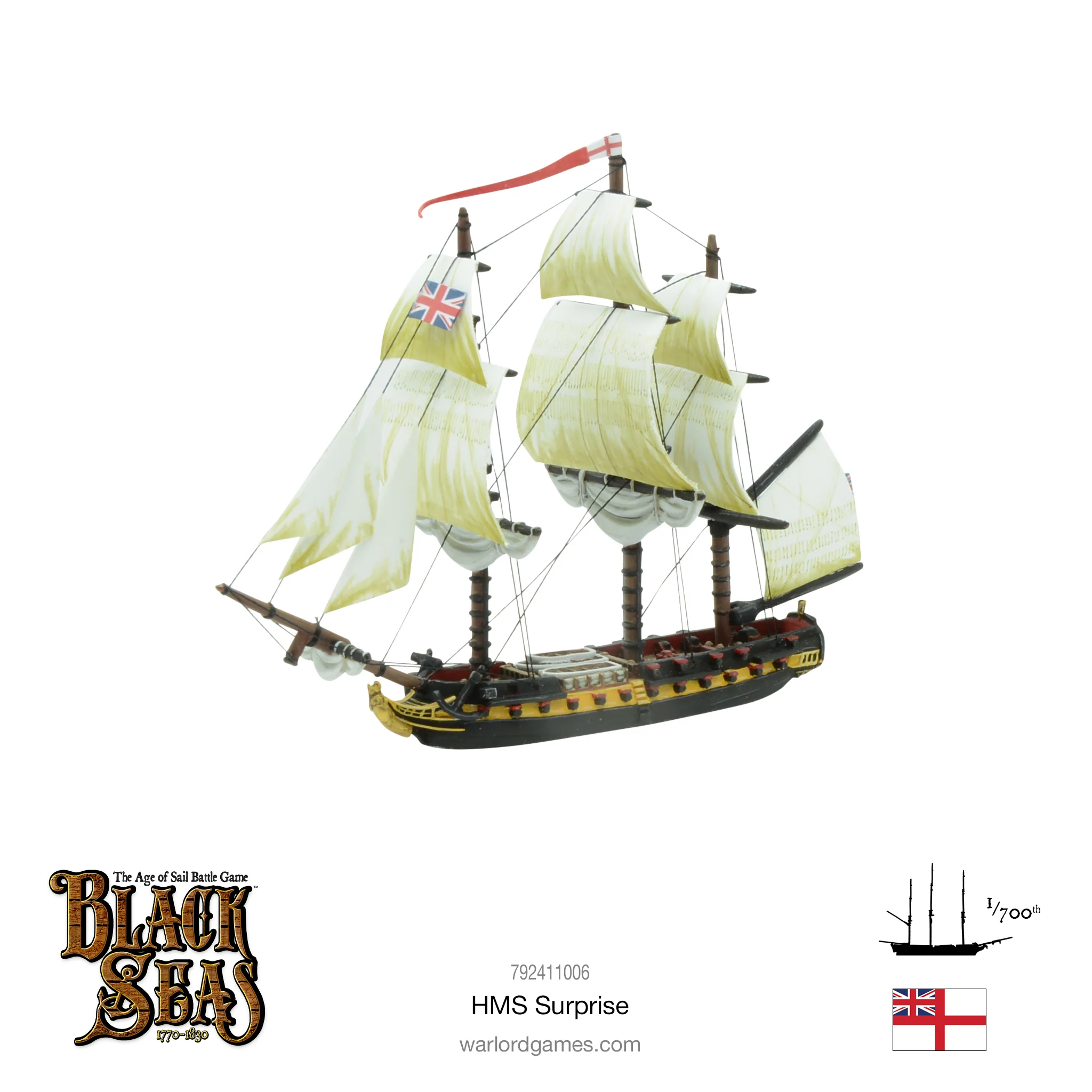
The land bound lubberly Napoleonic gamer isn’t left out either, with onshore action aplenty and a cutting out expedition would make for an incredibly tense, exciting game of Sharp Practice, enough that I’m planning to break my “No British” rule in order to get the crew of the HMS Surprise on the table towards the end of this year.
Avast Hauling, there!
There is no end to the saga. The books come to an abrupt halt with the death of Patrick O’Brian in January 2000. There is no final resolution, no aged last voyage that wraps up the series. That is more than fine to me. With no end in sight, it’s easy to imagine that somewhere out there in the big blue, Jack is still sailing, still going for his morning swim, still with a pun just out of reach, still with his eye firmly fixed on the prize and the horizon both. Stephen is still falling down ladders, excitedly searching for new plants and new encounters with Moon-faced Night Apes, still writing long letters on Irish Independence and the blaggard Napoleon. As long as the books are there, they’re still going. You could be too.
Questions, comments, suggestions? Think I’ve clearly gone insane because I’ve just written a two thousand word haigography for a fairly questionable book series with some problematic bits? contact@goonhammer.com, or leave a comment below
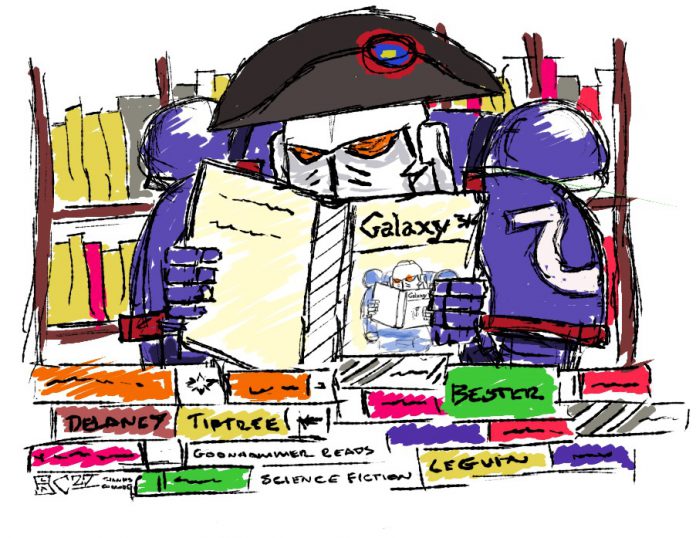


You must be logged in to post a comment.